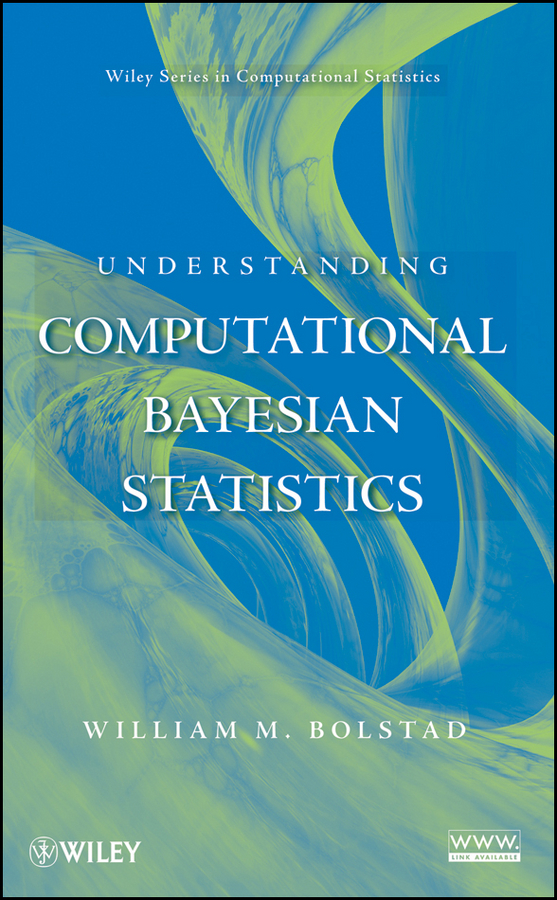Электронная книга: William Bolstad M. «Understanding Computational Bayesian Statistics»

|
A hands-on introduction to computational statistics from a Bayesian point of view Providing a solid grounding in statistics while uniquely covering the topics from a Bayesian perspective, Understanding Computational Bayesian Statistics successfully guides readers through this new, cutting-edge approach. With its hands-on treatment of the topic, the book shows how samples can be drawn from the posterior distribution when the formula giving its shape is all that is known, and how Bayesian inferences can be based on these samples from the posterior. These ideas are illustrated on common statistical models, including the multiple linear regression model, the hierarchical mean model, the logistic regression model, and the proportional hazards model. The book begins with an outline of the similarities and differences between Bayesian and the likelihood approaches to statistics. Subsequent chapters present key techniques for using computer software to draw Monte Carlo samples from the incompletely known posterior distribution and performing the Bayesian inference calculated from these samples. Topics of coverage include: Direct ways to draw a random sample from the posterior by reshaping a random sample drawn from an easily sampled starting distribution The distributions from the one-dimensional exponential family Markov chains and their long-run behavior The Metropolis-Hastings algorithm Gibbs sampling algorithm and methods for speeding up convergence Markov chain Monte Carlo sampling Using numerous graphs and diagrams, the author emphasizes a step-by-step approach to computational Bayesian statistics. At each step, important aspects of application are detailed, such as how to choose a prior for logistic regression model, the Poisson regression model, and the proportional hazards model. A related Web site houses R functions and Minitab macros for Bayesian analysis and Monte Carlo simulations, and detailed appendices in the book guide readers through the use of these software packages. Understanding Computational Bayesian Statistics is an excellent book for courses on computational statistics at the upper-level undergraduate and graduate levels. It is also a valuable reference for researchers and practitioners who use computer programs to conduct statistical analyses of data and solve problems in their everyday work. Издательство: "John Wiley&Sons Limited"
ISBN: 9780470567340 электронная книга Купить за 11472.97 руб и скачать на Litres |
Другие книги автора:
| Книга | Описание | Год | Цена | Тип книги |
|---|---|---|---|---|
| Introduction to Bayesian Statistics | "…this edition is useful and effective in teaching Bayesian inference at both elementary and intermediate levels. It is a well-written book on elementary Bayesian inference, and the material is… — John Wiley&Sons Limited, электронная книга Подробнее... | электронная книга |
См. также в других словарях:
statistics — /steuh tis tiks/, n. 1. (used with a sing. v.) the science that deals with the collection, classification, analysis, and interpretation of numerical facts or data, and that, by use of mathematical theories of probability, imposes order and… … Universalium
Computational archaeology — describes computer based analytical methods for the study of long term human behaviour and behavioural evolution. As with other sub disciplines that have prefixed computational to their name (e.g. computational biology, computational physics and… … Wikipedia
Comparison of statistics journals — This is a comparison of peer reviewed scientific journals published in the field of statistics. Contents 1 General information 2 Impact, indexing, abstracting and reviewing 3 Notes 4 … Wikipedia
Markov chain Monte Carlo — MCMC redirects here. For the organization, see Malaysian Communications and Multimedia Commission. Markov chain Monte Carlo (MCMC) methods (which include random walk Monte Carlo methods) are a class of algorithms for sampling from probability… … Wikipedia
Gibbs sampling — In statistics and in statistical physics, Gibbs sampling or a Gibbs sampler is an algorithm to generate a sequence of samples from the joint probability distribution of two or more random variables. The purpose of such a sequence is to… … Wikipedia
Degrees of freedom (statistics) — In statistics, the number of degrees of freedom is the number of values in the final calculation of a statistic that are free to vary.[1] Estimates of statistical parameters can be based upon different amounts of information or data. The number… … Wikipedia
